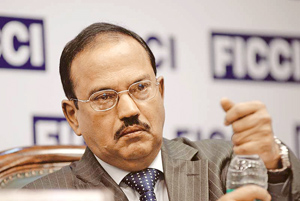New Delhi, Aug 19: Pakistan's invite to Kashmiri separatist leaders ahead of the NSA talks was "designed to scuttle" the August 23-24 parley, and follows a typical pattern the Pakistani military-intelligence establishment has been following since the Ufa talks between Prime Minister Narendra Modi and his Pakistani counterpart Nawaz Sharif to heighten tension, sources said on Wednesday.
The government was adopting a "wait and watch" mode and is keeping "all its options open" on the slated talks in New Delhi between India's National Security Advisor Ajit Doval and his Pakistani counterpart Sartaj Aziz.
The July 10 talks in Ufa, Russia, brought in a sense of bonhomie between the two neighbours, with a joint statement issued, which included the NSA talks in New Delhi to discuss the issue of terrorism.
But immediately after that, tension was ratcheted up by Pakistan over the Ufa meeting, with cross border firings, in which mortar shells were used, then the Gurdaspur and Udhampur attacks followed, and the latest was the invite to the Hurriyat on August 23 to meet Aziz.
"The game plan is very clear - to scuttle the talks from day one," said the sources, adding that they were watching to see how the situation evolves.
"We are monitoring the situation, and will respond appropriately," the sources said, but declined to elaborate on what it means by "appropriately".
Aziz also took "20 days" to confirm if he would attend the talks, adding to the atmosphere of uncertainty.
Since Kashmir is not to be discussed between the two NSAs, inviting the Kashmiri separatists does not really make sense.
While India maintains that talks and terror cannot go together, it was not shying from talks on terror, said the sources.
India had called off the foreign secretary-level talks on August 25 last year after the Pakistani envoy met the Kashmiri separatists ahead of the meeting, despite India requesting him not to do so and warning that it would adversely impact the talks.
But in this case, the meeting is yet to take place between Aziz and the separatists on August 23.
Pakistan's ratcheting up of tension comes even it is on losing ground among countries in the region.
Afghanistan has openly hit out at Pakistan for terror attacks, with Afghan President Ashraf Ghani, in a series of tweets on August 10, asking Pakistan to refrain from launching terror attacks on his country.
During Prime Minister Modi's visit, India and the United Arab Emirates, a former close friend of Pakistan, issued a joint statement on terror that in clear terms speaks against nations exporting terror in the name of religion and calls for the dismantling of terrorism infrastructure and bring perpetrators to justice.
Separatist leaders in Jammu and Kashmir on Wednesday said the Pakistan envoy in Delhi invited them for talks with Sartaj Aziz before he holds talks with his Indian counterpart.
Both the factions of the Hurriyat Conference headed by Syed Ali Shah Geelani and Mirwaiz Umar Farooq and other separatist leaders such as Yasin Malik and Naeem Khan have been invited by Pakistan High Commissioner Abdul Basit for talks on August 23.





Comments
Add new comment